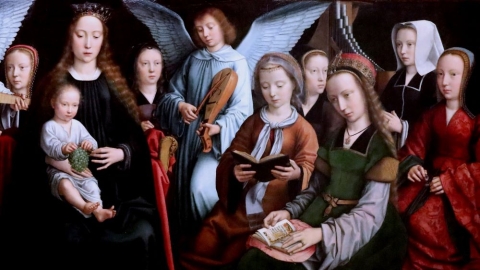The Holiness of the Church (16): The Virtue of Humility

Behold the handmaid of the Lord
According to a paradox taken up by several preachers, “in heaven there are all sins except pride; in hell all the virtues except humility.” This aphorism, however paradoxical and parenetic it may be, is based on the Gospel: Jesus Christ asked us to imitate Him in His humility (Mt. 11:29), and gave Himself as an example when He washed the feet of His disciples (Jn. 13: 1-15).
Humility is not only necessary to obtain the forgiveness of sins, but also to grow in holiness. It is indeed the condition of authentic spiritual growth, without the danger of seeing everything tainted by pride, which has separated angels and rebellious men from God. Likewise, it was the humility of the Virgin who began the work of redemption, which consisted precisely in the self-emptying (exinanitio) of Our Lord Jesus Christ, according to the words of St. Paul (Phil. 2:7 ).
But what is the virtue of humility? To what can we attach it? For St. Bernard, it is perfect self-knowledge, by which man considers himself vile. This knowledge is a virtue precisely insofar as it is linked to truthfulness and justice. Justice consists in attributing all good to its true beginning and to its author, who is God alone, to Whom belongs all honor and all glory.
Humility is a Christian Virtue
From an apologetic point of view, humility is a properly Christian virtue, because it was unknown to the pagan world. No philosopher of antiquity, however acute his considerations on the virtues, ever cited humility among them.
There is indeed a deep link between humility and the incarnation of the Word, as St. Paul demonstrates in the letter to the Philippians already quoted. Humilitas derives precisely from humus, the earth, this earth from which man was drawn from the beginning, and on which the Son of God chose to incarnate Himself by taking on this same human nature that came from the mud.
Only humility enables us to understand the logic of the Gospel and to practice the virtues without deception, as a gift from the Redeemer, and not as our own work. The Gospel continually warns against a vain practice of virtues, like that of the scribes and Pharisees, spoiled by pride.
And it continually invites us to keep ourselves hidden, to consider ourselves insufficient, transferring all the good to God: “So you also, when you shall have done all these things that are commanded you, say: We are unprofitable servants; we have done that which we ought to do” (Lk. 17:10).
St. Thomas explains: “In man, two things can be considered, namely, what is of God and what is of man. Of man, there is everything that has to do with defect; but of God there is everything that pertains to salvation and perfection” (II-II, 61, 3).
The Catholic Virtue of Humility
The Roman Church, in its social form willed by Christ, is a place where the virtue of humility of the saints is constantly encouraged and made possible. It is precisely because the nature of authority in ecclesiastical society is such that in all external relations it takes precedence over virtue and holiness.
It may seem like a strange paradox, but that is how Christ founded His Church. Hierarchical relations are not based on the degree of virtue or grace, but on something prior to them: on the capacity to confer grace (cf. Suppl. q. 34, art. 1, ad 3um).
In this way, holiness and graces gratis datae – or charisms – remain subject to the control and continuous verification of authority, thus avoiding the danger of pride. By submitting invisible holiness to a visible order on this earth, the Roman Church makes herself the guarantor and protector of the authenticity of her saints.
Even when she supports them during their lifetime, as has happened with many saints who have received credit, honors, and offices from the Church, the visible hierarchy prevents the saint from exalting himself for his own invisible merits. He can always rely sincerely on his own role when he exercises authority or collects the credit that the faithful place in him, while continuing to consider himself as a useless instrument.
We know the story of St. Philip Neri sent by the Pope to verify the sanctity of a nun who enjoyed great renown as a mystic. Arriving at the monastery, he immediately asked to speak to the nun who, as soon as she descended into the parlor, with a deep bow, said to him: “How can I be of use to you?”
The saint, who was comfortably seated in his chair, without even responding to the greeting, held out his foot to her, saying: “First of all, Reverend Mother, I would ask you to take off these muddy shoes and clean them well for me.”
The nun recoiled in stupefaction and, with heartfelt words, complained about such a rude way of proceeding, saying, “I wonder how you dare make such a request of me.” St. Philip kept silent, got up quietly, and left the convent to return home, pointing out to the pope that this “saint” did not have the fundamental virtue.
Humility and the Neighbor
Humility therefore consists in recognizing what one is before God. But to be authentic, humility must be verified in relation to one's neighbor. It would be too easy to declare oneself small before God but superior to one's neighbor. We have seen how Our Lord insisted that we consider ourselves (sincerely and not for show) as the least and the servant of all.
St. Anthony learned by divine inspiration that there was in Alexandria a man holier than himself, and he wanted to meet him to perfect himself by his example. This man was a shoemaker who led a simple life, made up of work and prayer, and who gave part of his possessions to good works.
St. Anthony, who had done many good works and left all his possessions, sought to know what was the secret of this man, who was apparently living an ordinary Christian life in a city full of opportunities for sin, from which the saint had fled. When questioning him, he heard this: “I don’t do anything special. Only, while working, I look at the people who pass in the street and I say in myself: “Lord, that all are saved. I, I alone, will be lost.”
Humility and Love of the Cross
He who knows himself to be a sinner knows that he deserves the cross, knows that he wants to follow Jesus Christ in this way, and therefore desires humiliation, from which authentic humility is born. One can be considered in the world and be holy, but one cannot want to be considered in the world and be holy.
This is the meaning of the degrees of humility of the spiritual exercises of St. Ignatius, for whom the pinnacle of humility consists in this interior preference for the cross, which in a certain way goes beyond indifference even for the means of salvation. expressed in the principle and the founding principle: if we are ready to take the means that God assigns to us, we cannot internally not prefer opprobrium to honors.
To conclude on this theme, and as a conclusion to this series of articles, let us quote an episode in the life of St. Francis on perfect joy. If we could inwardly make all that emerges from this example our own, we would no longer need articles on holiness, nor pious considerations, but we would truly achieve that desire to embrace the cross to which the Savior exhorts us by His example.
The saint from Assisi, who was traveling with Brother Leo, began to say that no success, even spiritual or evangelizing, constitutes “perfect joy.” After two kilometers of such a speech, at the invitation of Brother Leo, St. Francis ends by revealing what is this “perfect joy” that every Christian must deeply desire, in the spirit of the new law of the beatitudes.
“When we arrive at St. Mary of the Angels, wet from the rain and freezing with the cold, covered with mud and afflicted with hunger, and knocking at the door, the doorman arrives in anger and asks: 'Who are you?’ And to our answer he retorts: ‘You are not telling the truth. On the contrary, you are two scoundrels who go about deceiving the world and stealing alms from the poor; go away.’”
“And if he doesn't open the door, and keeps us out in the snow and the cold and hunger until nightfall; then if we patiently bear so much injustice and cruelty without being troubled and without murmuring about it; and we humbly think that the doorman really knows us, and that it is God who pushes him to speak against us: Brother Leo, make note that there is perfect joy.”
“And if we persist in knocking, let him come out irritated, and, like importunate scoundrels, drive us away with insults and reproaches, saying: ‘Go away, you most vile thieves, go to the hospital, for here you will neither eat nor lodge.’ If we endure this with patience, with joy and with love: Brother Leo, write down that there is perfect joy.”
“And if, although constrained by hunger and cold, we beat, call and pray for the love of God with great tears, so that he opens us and puts us inside; and the more he is scandalized, the more he will say: ‘They are importunate scoundrels, I will pay them well as they deserve.”
“And let him come out with a gnarled stick, take us by the hood, throw us to the ground, roll us in the snow, and beat us with this stick: if we bear all this with patience and good humor, thinking of the sufferings of the Blessed Christ, of all that we have to bear for Him, write, Brother Leo, that there is perfect joy.”
And, therefore, listen to the conclusion: above all the graces and all the gifts of the Holy Ghost, which Christ grants to His friends, there is the fact of overcoming oneself and willingly enduring, for the love of Christ, pains, insults, and difficulties.
Indeed, we cannot boast of all the other gifts of God, because they are not ours, but God's; wherefore the Apostle says, “What have you that you do not have from God?” But we can boast of the cross of tribulation, for it is ours; this is why the Apostle says: “I will only boast of the Cross of our Lord Jesus Christ.”
Related links
(Source : MG - FSSPX.Actualités)
Illustration : Flicr / Jean Louis Maziere (CC BY-NC-SA 2.0)





